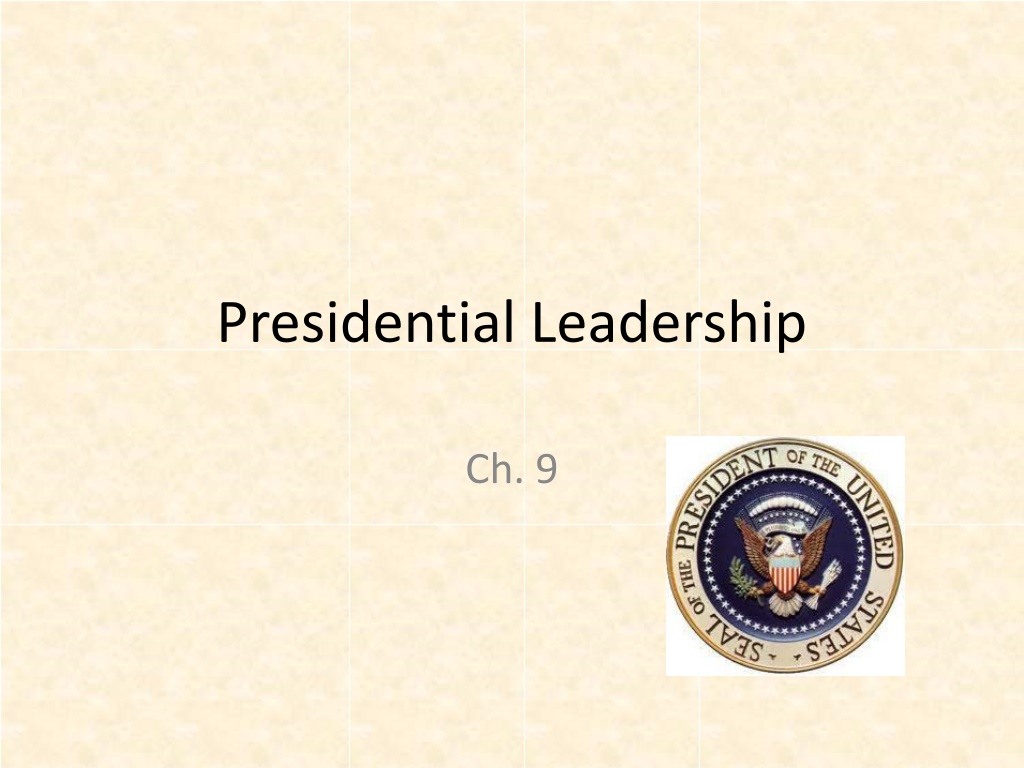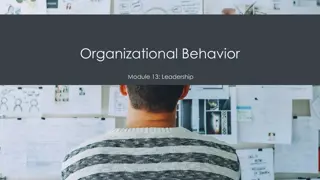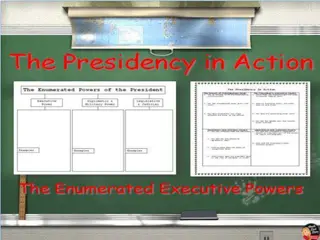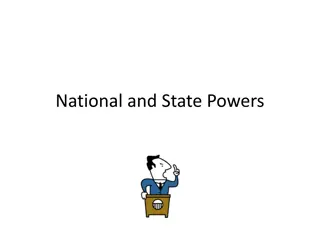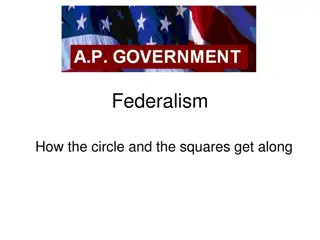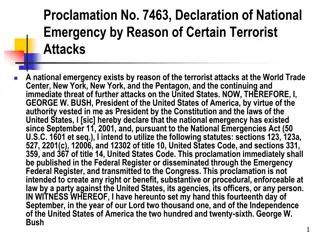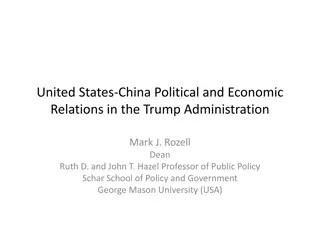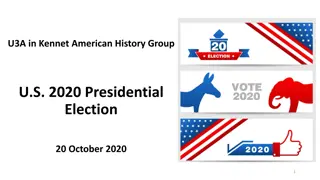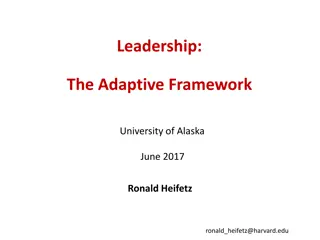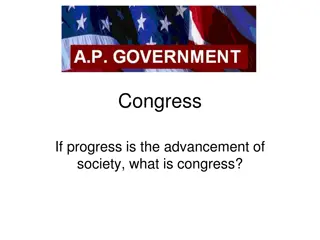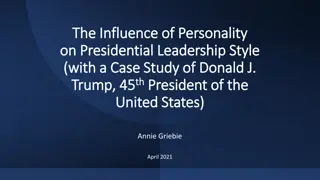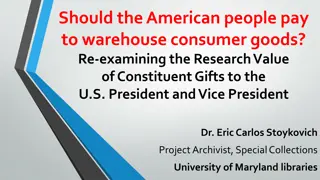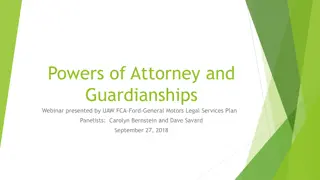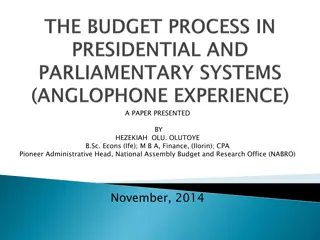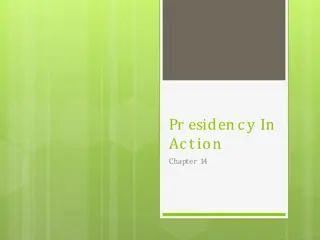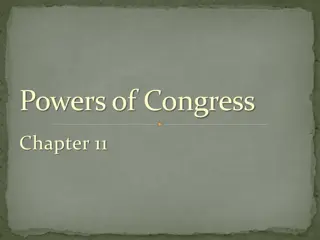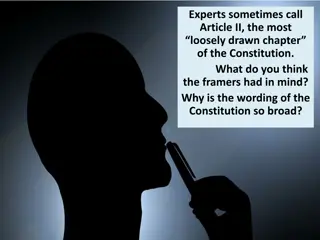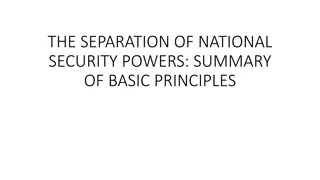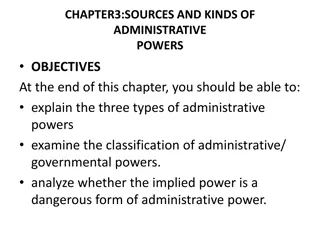Understanding Presidential Powers and Leadership in the U.S.
The Constitution lays a broad framework for presidential powers, with inherent powers being claimed by presidents outside the Constitution. Informal sources of power, such as executive privilege, also play a role. Modern presidents use mass media to build support for their ideas but face limitations from Congress, the Supreme Court, federal bureaucracy, and public opinion.
Download Presentation

Please find below an Image/Link to download the presentation.
The content on the website is provided AS IS for your information and personal use only. It may not be sold, licensed, or shared on other websites without obtaining consent from the author. Download presentation by click this link. If you encounter any issues during the download, it is possible that the publisher has removed the file from their server.
E N D
Presentation Transcript
Presidential Leadership Ch. 9
Sources of Presidential Powers Lesson 1
The Constitution is broad but vague when it comes to the powers of the President. It says that the executive power of the nation will be vested in a president
Constitutional Powers Two major reasons for a strong executive government -The founders recognized the need for a strong executive branch to overcome the weaknesses of the Confederation government and to hold the legislative branch in check -The Founders distrusted direct participation by the people in decision making. They wanted a strong executive branch that would protect liberty, private property, and businesses
Inherent Powers powers not described in the Constitution, but that have been claimed by presidents Presidents have expanded Presidential power by using the loose interpretation of the Constitution.
Informal Sources of Power Presidents have added to their powers by their actions (Jefferson) Immediate need of the nation (sometimes congress gives presidents special powers for a limited time) (Lincoln) Executive Privilege the right of the president and other high executive officers to refuse to testify before congress or a court
Cont. Modern presidents claim their ideas and policies represent a mandate from the people, and they use all forms of mass media to build support for their ideas. (Forum)
Limits of Presidential Power Congress can override a veto or impeach the president The Supreme Court can overturn presidential actions Federal bureaucracy sometimes limits presidential power by obstructing programs or failing to carry them out properly Public opinioncan limit the president s actions (ex. Vietnam war) (watch video)
How can public opinion limit the president s power?
Chapter 9 Sec. 1 Presidential Powers 1. Why did the founder want a strong central government? (2 reasons) 2. List the Presidential Powers granted in the Constitution. 3. List the informal sources of Presidential Power. 4. Define Executive Order, Mandate, and impeach 5. List the ways Presidential Powers are limited according to the Constitution. 6. Name the seven roles of the President
Roles of the President Lesson 2, 3, & 4
Head of State Represents the nation at ceremonial functions Is considered more than a politician, but rather a symbol of the entire United States
Chief Executive Head of the executive branch Influences how laws are executed through executive orders, presidential appointments, removal of appointed officials, and impoundment Grant pardons, reprieves, or amnesty
Commander in Chief Shares with Congress the power to wage war Makes key military policy decision, Shadow War Supports war efforts on the home front during wars May use the armed forces to end disorders and give aid in natural disasters
Commander and Chief cont. After 9/11 President Bush expanded the presidential powers with the passage of the Patriot Act this act gave the executive branch the right to gather information on possible suspects of terrorism National Security protection of the nation Military Tribunal military court designed to try members of enemy forces during wartime
Chief Diplomat Directs foreign policy and oversees foreign affairs information agencies Makes treaties, with Senate approval May make, executive agreements Sole power to recognize foreign governments
Chief Legislator Proposes legislation to Congress, usually in the State of the Union Address Must work harder for congressional support when Congress is controlled by the opposition party May use political favors to gain congressional support Has the threat of the veto to influence Congress
Economic Planner Holds important economic powers Promotes high employment, production, purchasing power Required to prepare the federal budget each year, helped by the Council of Economic Advisers Appoints board of the Federal Reserve System
Party Leader Help raise party funds and plan campaign strategies Uses political patronage to appoint party members to government jobs
Do you think a president with military experience makes better decisions as commander in chief? Explain your answer
-Make a foldable describing the Seven Roles of the President -must include key terms and they must be underlined Turn in for a grade Rubik Title 10 points Seven Roles 70 points (10 points each) Neatness ..10 Followed Instructions..10 Total 100 points test grade
